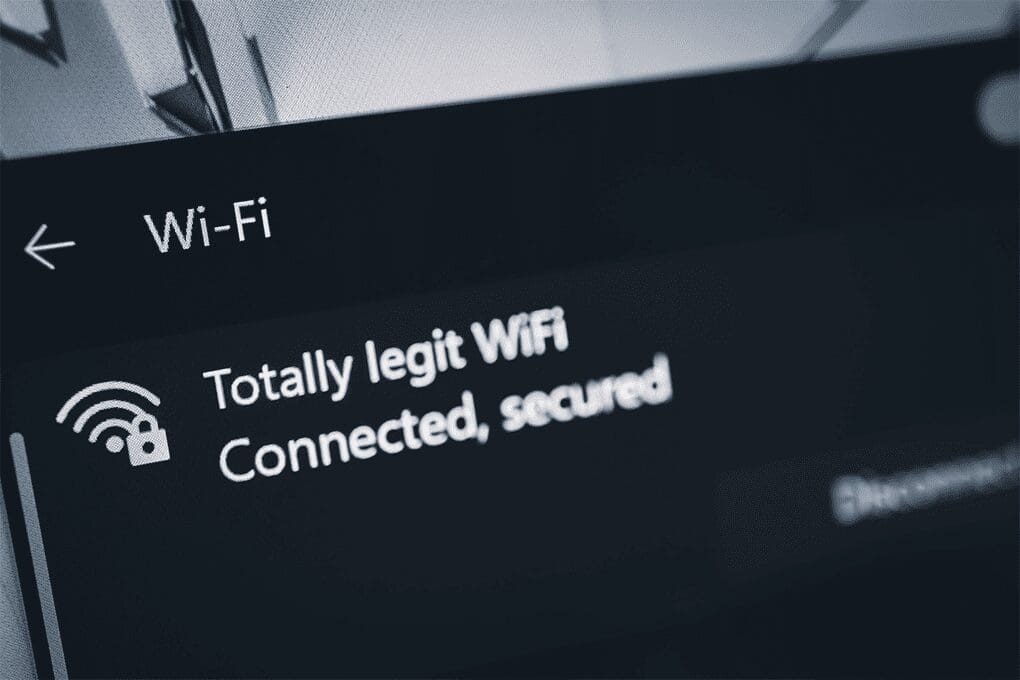Every three minutes, hackers attempt to breach a home WiFi network. While no network is completely impenetrable, you can make yours significantly harder to crack by implementing the right security measures.
Think of your WiFi network like your home’s security system – each layer of protection makes it harder for intruders to get in. Just as you wouldn’t leave your front door unlocked, leaving your network unsecured invites trouble. When hackers breach your WiFi, they can:
- Monitor all your online activity
- Steal passwords and banking information
- Access your connected smart devices
- Use your network for illegal activities
This guide will walk you through practical steps to transform your WiFi from an easy target into a digital fortress. Whether you’re tech-savvy or just getting started with network security, you’ll learn proven methods to protect your home network.
Key Takeaways:
- WiFi allows us to access the internet through radio waves that allow for high transfer speeds using a router or a similar device.
- It’s vital to have good WiFi security to protect your devices from malicious attacks and viruses.
- Some ways you can increase your wifi security are by using strong passwords, using a VPN, and many other easy methods you can implement today.
Table of Contents
- What is WiFi?
- How Does WiFi Work?
- Why Having A Secure WiFi Is Important
- How To Protect Your WiFi From Being Hacked
- Creating and Managing Strong WiFi Passwords
- Smart Password Sharing Practices
- Where to Find the Best Secure Routers and VPNs
- Choosing Your Secure Router
- Selecting the Right VPN
- Making Your WiFi Network Secure: The Bottom Line
Every day, billions of us connect to the internet through invisible signals that fill our homes and offices. But what exactly is WiFi, and why does its security matter?
What is WiFi?
Think of WiFi as an invisible bridge between your devices and the vast world of the internet. Using radio waves – similar to those in your car radio but much more sophisticated – WiFi creates a wireless highway that carries your emails, streaming videos, and online banking data through the air to your router, which connects to the broader internet.
With over 542 million public WiFi networks worldwide and the average U.S. household now managing 22 connected devices, this wireless technology has become the backbone of our digital lives. From smart thermostats to gaming consoles, nearly every modern device relies on WiFi to function.
How Does WiFi Work?
The process of how wifi works is quite complex, but it can be boiled down to radio waves. Let’s say you have a smartphone, that phone will be connected to your router via these radio waves:
Your router acts as a sophisticated digital traffic controller, managing a complex network of communications:
- Broadcasts radio signals between 2.4 GHz and 5 GHz
- Creates a secure local network using WPA3 encryption
- Manages dozens of simultaneous device connections
- Directs data packets through the most efficient paths
- Maintains connection speeds up to several gigabits per second
Modern WiFi networks can handle massive amounts of data – the latest WiFi 6E standard can transfer up to 9.6 Gbps, nearly three times faster than its predecessor.
Why Having A Secure WiFi Is Important
It’s not a nice thought, but sadly, the internet is filled with people and software that want nothing more than to gain access to your information for shady purposes. The less secure your wifi is, the more you’re opening yourself up to being exploited.
The stakes of WiFi security have never been higher. In 2023:
- Over 2.7 million WiFi networks were targeted by hackers
- The average cost of a data breach reached $4.45 million
- 67% of successful cyber attacks targeted home networks
- WiFi-based attacks increased by 240% from the previous year
An unsecured network leaves you vulnerable to:
- Man-in-the-middle attacks intercepting sensitive data
- Password and identity theft
- Financial fraud and unauthorized transactions
- Malware infections across all connected devices
- Network hijacking for illegal activities
While achieving perfect security is impossible, implementing strong protective measures can make your network significantly harder to breach. Modern encryption standards like WPA3, when properly configured, can protect against most common attack methods.
Becoming 100% secure is quite a tall order, but there is a lot you can do to get started with making yourself a lot harder to hack.
Securing your WiFi network is akin to fortifying the digital gateway to your personal domain. Implementing robust passwords, enabling WPA3 encryption, and keeping your router firmware updated are not just technical tasks; they are fundamental practices in crafting a resilient barrier against the relentless tide of cyber threats.
– Kurt Sanger Cybersecurity Expert
How To Protect Your WiFi From Being Hacked
There are quite a few measures you can take to protect yourself from hacking, and we will cover some of the top methods now. These methods will already help a lot, but you can also check out this list of 5 tips for cybersecurity for further information on the subject.
Creating and Managing Strong WiFi Passwords
The password you use for your WiFi can make a huge difference. If the password uses your name and birth year, for example, then a hacker wouldn’t have to do much guessing to discover what it is.
That’s why it’s a great idea to use passwords that are easy for you to remember, but based on things people who don’t know you won’t be able to guess.
Even if you use great passwords, it’s still a good idea to change them fairly frequently. That will make it even more difficult for hackers to guess what it is. It may seem like a simple thing, but having inaccessible passwords is a great first step toward making yourself more secure.
Keeping track of all these passwords can become tricky, so we would recommend using a service like the 1Password password manager to make it more manageable.
Recent studies show that cybercriminals can crack a simple password in less than three hours. Yet despite this risk, many people still use basic passwords like “password123” or their birthday. Creating and managing strong WiFi passwords is essential for protecting your network from unauthorized access.
Password Best Practices
The right password can mean the difference between a secure network and a data breach. In 2023, weak passwords were responsible for 81% of hacking-related breaches. To protect yourself, follow these essential guidelines for creating strong passwords:
- Use at least 12 characters
- Combine uppercase, lowercase, numbers, and symbols
- Avoid personal information (birthdays, names, addresses)
- Create unique passwords for different networks
- Change passwords every 90 days
While these requirements might seem demanding, they reflect the sophisticated tools hackers use to breach networks. A complex password that takes you an extra minute to type could save you from months of dealing with identity theft or financial fraud.
Using Password Managers
The complexity of modern password requirements can make them difficult to remember and manage. This is where password managers become invaluable tools for maintaining your digital security.
- Secure password generation
- Encrypted storage
- Cross-device synchronization
- Automatic password updates
- Breach monitoring alerts
Password managers like 1Password not only keep your credentials secure but also make them easily accessible when you need them. Think of them as a digital vault – highly secure, but conveniently accessible to authorized users.
Smart Password Sharing Practices
In our connected world, sharing WiFi access has become as common as sharing a cup of coffee. However, each person who knows your password becomes a potential security risk, whether intentionally or not.
Who Should Have Access
Before sharing your password, consider implementing a tiered access system that provides appropriate levels of security for different users:
- Primary network: Immediate family and trusted devices
- Guest network: Visitors and temporary users
- IoT network: Smart home devices and appliances
This structured approach allows you to maintain security while still providing convenient access to those who need it. By segregating your network, you create multiple layers of protection for your most sensitive information.
Red Flags for Password Requests
Scammers often use social engineering to gain network access. Being able to identify suspicious requests can protect you from falling victim to these schemes:
- Someone calls you unexpectedly
- You receive unsolicited emails requesting access
- Someone claims to be from tech support
- A service demands immediate password changes
- You feel pressured or rushed
Remember that legitimate organizations will never pressure you to share your password immediately. Take time to verify any request that seems unusual or unexpected.
Safe Sharing Guidelines
When you do need to share access, following these best practices can help maintain your network’s security:
- Use secure communication methods
- Change passwords after temporary access ends
- Document who has access and when
- Regularly audit network access
- Consider using a guest network instead
The key is to treat your WiFi password like a spare key to your house – share it only when necessary, keep track of who has it, and change it if it falls into the wrong hands.
Be Careful Who You Give Your Password To
Even if you have an incredible set of passwords that you update monthly, it will be pointless if you hand them out like Halloween candy. Naturally, there are people you can trust your passwords with.
Most people will be okay with friends and family knowing their passwords, but it can be okay to share with outside parties. This is something you should be very careful with, however, and you should only give out passwords to people you absolutely trust.
A good rule of thumb is to never give out passwords to people who contacted you instead of you contacting them. If you contacted a financial adviser to help you work out your taxes, then giving them password access may be advisable.
However, if you’re cold-called by someone claiming to work for your bank, for example, then you should definitely not give them any information. It’s never rude to say no to giving your password to someone you don’t trust implicitly.
Create A Guest WiFi
Creating a guest wifi network can be a great solution for safety, especially if you will be granting people you don’t know access to your router. For instance, you may have an Airbnb room in your home. If you give tenants access to your main network, then they may be able to access your information.
Creating a guest wifi network will separate the connections and make it harder for guests to pry into your information.
Enable WPA3 Encryption
Encryption involves converting data to a specific code language that only people with the key can decipher. Encryption can be strong or weak, so you want to make sure that you have the strongest encryption possible.
WPA3 encryption is recommended for wifi connection, as it is the most up-to-date encryption available currently. Whenever you have the choice, this is the encryption type you should pick for your wifi.
Keep Your Router Firmware Up To Date
Whenever you have a device that can connect to the internet, there will likely be fairly regular firmware updates. This will be the case whether it’s a gaming console, a home security camera or a router.
These updates are usually pretty small and may therefore seem unimportant. However, you should always perform these updates whenever possible, as they will often incorporate the latest security measures to keep your protection up to date.
Use A Firewall
A firewall is a layer of protection that will monitor information processed to and from your network. This firewall will detect potentially malicious software or other threats to your network.
Many antiviruses will include a firewall feature, and it’s definitely something you will need to prioritize for your safety. In addition to a good firewall, services such as Identity Guard can also be incredibly helpful in protecting you and your family from a variety of attacks and breaches.
Be Careful With Public Wifi
When you’re dealing with your own home wifi network, you know the layers of protection that are in place because you would have implemented them yourself.
When you’re on public wifi, you have no assurances about the security measures the admin has implemented, so care is definitely recommended.
For example, if you’re using wifi at a cafe or hotel, you should avoid accessing any sensitive or private information, as hackers may be able to easily access it.
Use A VPN
VPNs, or Virtual Private Networks, have many great uses. This is why we always recommend them to anyone using the internet, as they provide unparalleled internet access and anonymity.
A VPN can also make you much harder to track and monitor, so it can be a real headache for hackers to bypass. NordVPN is always a great choice to start with, as we consistently rank it as one of the best VPNs on the market.
Verify Connected Devices
In your home, you’ll probably have a good idea of the devices that re connecting to your network. For example, you may have 3 smartphones, a laptop, a smart TV and a Playstation 5 connected to your wifi.
You can monitor that these are the only connected devices, and that means you can see if an unidentified smartphone has mysteriously connected. This could mean that someone has guessed your password and can therefore access your network.
That’s why it’s always a good idea to verify and keep track of any connected devices.
Enable MAC Address Filtering
MAC address filtering is a feature that some routers have. Essentially, this feature allows you to limit and control which devices can access your network. Having this extra degree of control makes it more unlikely that unauthorized devices will be able to connect, so we recommend having it turned on.
Use A Secure Router With Quality Security Features
Unfortunately, not all routers are created equally, and some may lack essential security features. That’s why it’s always best to go for routers that have more comprehensive features.
The more secure a router is, the pricier it may be. It’s usually worth it to pay a bit more for extra security, but you can often find some really decent, reasonably-priced routers that will get the job done.
Where to Find the Best Secure Routers and VPNs
Choosing Your Secure Router
Our top picks focus on a balance of security features, performance, and value:
- Small business-grade security
- Enterprise-level encryption
- Regular firmware updates
- Advanced threat protection
- Flexible budget options
Check out our detailed router comparison guide for specific recommendations across all price points.
Selecting the Right VPN
When it comes to VPN services, we’ve thoroughly compared the market leaders:
NordVPN stands out for:
- Military-grade encryption
- No-logs policy
- Fast connection speeds
- Large server network
For detailed comparisons, see our head-to-head reviews:
- NordVPN vs. Private Internet Access (PIA)
- NordVPN vs. Surfshark
- Other top VPN comparisons
Each comparison breaks down key features, pricing, and performance to help you make an informed decision based on your specific needs.
Making Your WiFi Network Secure: The Bottom Line
While no network is completely hack-proof, you can significantly reduce your risk of cyber attacks by taking the right precautions. Think of network security like layers of an onion – each measure you add makes it harder for attackers to reach your sensitive data.
Take Action Today:
- Update your router’s firmware regularly
- Use strong, unique passwords
- Enable WPA3 encryption
- Set up a guest network
- Monitor connected devices
- Consider a security-focused router
Remember: Cybersecurity isn’t a one-time setup – it’s an ongoing process. By staying vigilant and keeping your security measures up to date, you can help ensure your network remains a strong fortress rather than an easy target.





